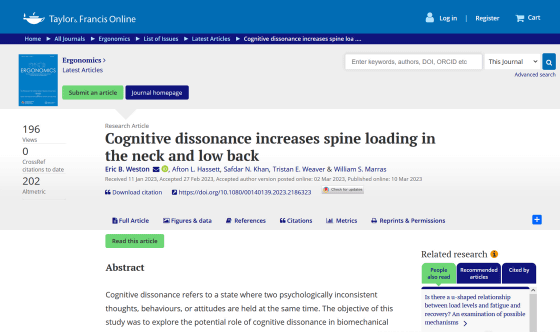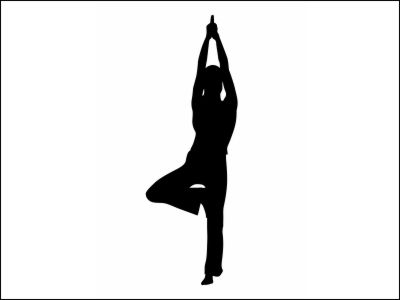Psychological stress during work increases the load on the body, and the possibility that mental pain causes physical pain

There is a saying, 'Illness starts with mind,' but in recent years it has been found that various psychological factors are actually related to illness and health problems. A new study suggests that people who experience ``
Cognitive dissonance increases spine loading in the neck and low back: Ergonomics: Vol 0, No 0
https://doi.org/10.1080/00140139.2023.2186323

Your thoughts can harm your neck and back during lifting tasks
https://news.osu.edu/your-thoughts-can-harm-your-neck-and-back-during-lifting-tasks/
Thoughts Inside Your Head Can Unleash Physical Pain, Study Finds : ScienceAlert
https://www.sciencealert.com/thoughts-inside-your-head-can-unleash-physical-pain-study-finds
The pain that occurs in the body is not just a physical reaction, but a phenomenon that interacts with social and psychological stressors in a complex manner. Therefore, in addition to being caused by deterioration of economic and mental conditions, we also know thatmeditation and kind behavior alleviate physical pain.
Professor William Maras , executive director of the Ohio State University Spine Research Institute , pointed out that past research has shown that psychological stress has a physical effect on the spine. “We have found that certain personality types increase the load on the spine by up to 35%. Exposure to this type of psychosocial stress tends to co-activate core muscles. 'Because the body is in tension, the muscles are pulled.'

Newly, Maras et al.'s research team conducted research to investigate whether ``cognitive dissonance,'' in which multiple conflicting beliefs occur in the mind, has a physical effect on the back and spine. rice field. ``In this study, we explored cognitive dissonance, which is disturbed by how people think and think, to explore the mind-body connection,'' Maras said.
The research team asked 17 invited subjects to wear motion sensors and perform a simple task of 'moving a light box to an accurate position'. Subjects ranged in age from 18 to 44 years, with 9 males and 8 females.
Subjects were given one short trial to practice the task, followed by two 45-minute task-execution trials. Of the two execution trials, positive feedback was given to the subject during work in the first trial, but in the second trial, the subject's movements did not change. Even without it, I was given negative feedback such as 'I'm not getting enough performance.' During this time, the research team measured the load on the subject's spine with sensors and motion capture, and estimated the cognitive dissonance felt by the subject based on changes in blood pressure and heart rate and questionnaire results.

As a result of the analysis, when the subjects suffered from negative feedback and suffered from cognitive dissonance, the load on the cervical spine of the neck increased by 9.4 to 19.3% compared to when it was not, and the load on the lumbar region increased. We found that the load increased by 1.7-2.2%. 'One of the motivations for this study was to see if the effects of cognitive dissonance extend beyond the lower back,' Maras said. ' said.
The greater the load on the spine, the more likely it is that pain will occur. ``It's not a big deal if it's just a few percent of the load one time,'' Maras said. And this is a serious thing, and it may be the difference between whether or not the disorder appears, 'he argued that cognitive dissonance could have a significant impact.
Related Posts:
in Science, Posted by log1h_ik







